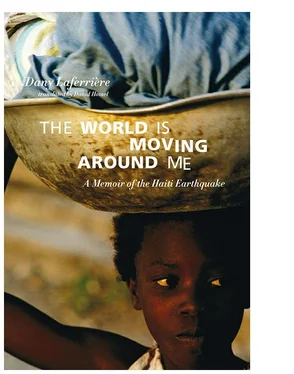The Radio
A car parked by the sidewalk, its motor still running. The radio was playing. People have stopped bothering to cut the engine when they leave their cars. I was trying to get news of other parts of the city. People wanted to know how bad the damage was. But I heard only static, or a pre-recorded program. I turned the dial and tuned in RFI (Radio France Internationale) that gave no news of the earthquake, at least not yet. I turned off the radio. Where was the driver? People were figuring it was less dangerous on foot. They left their cars behind and took to the road, often with no destination. People who had never done more than a hundred meters on foot walked kilometers that night and felt no fatigue. Their minds were so upset, they lost all awareness of their bodies. Two groups of people have always rubbed shoulders in this city: those on foot and those who own a car. Two parallel worlds that meet only by accident. “You can’t know your neighbor if you drive through the neighborhood,” said a grieving mother who lost her son. She said that the poorest residents — whom she had never met before, even though she passed through the area twice a day — were the first to support her when she learned that her son was dead in the wreckage of his house. For once, in this city ruled by social barriers, everyone moved at the same speed.
A Prayer
Night falls suddenly as it always does in the tropics. We whisper our fears to each other. Now and then, we hear a muffled cry: someone has managed to reach a family member on the phone and has gotten news. A young bank clerk tells me he is afraid to call home for fear of what he might find out. His family lives in Pacot, one of the hardest hit zones. I don’t know what to say. Suddenly, a man gets to his feet and begins telling us that the earthquake is the result of our unspeakable behavior. His voice rises in the night. We quiet him down because he’s waking the children who have just fallen asleep. A lady tells him to pray in his heart. He walks away, insisting that you can’t ask the Lord’s forgiveness in a low voice. A group of girls launches into a religious song, so soft that some adults manage to fall asleep. Two hours later, the air is full of noise. Hundreds of people are praying and singing in the streets. For them, this is the end of the world announced by Jehovah. Next to me, a little girl wants to know if there will be school tomorrow. A breath of childhood settles over us all.
Animals
Dogs and roosters kept us company through the night. The Port-au-Prince rooster crows whenever he feels like it. Normally I hate this habit. But that night, I listened for his cry. We didn’t hear cats meowing. Port-au-Prince is more a dog city. Dogs, most often in the streets, survived, while the cats that hid under beds and in closets didn’t make it. As for the birds, they took flight at the first movement of the earth.
The Crowd
On that first night, the city was filled with a disciplined, generous, and restrained crowd. People ceaselessly moving with other-worldly determination. They seemed unconcerned with the pain they bore with an elegance admired the world over. The rest of the planet was glued to the small screen, watching the strange ceremony wherein the living and the dead mingled so perfectly they couldn’t be told apart. Malraux, just before his death, traveled to Haiti because he felt that the painters of Saint-Soleil had intuitively discovered something that makes all struggle against death fruitless. A secret path. People were amazed by that ability to remain in the wreckage so long without eating or drinking. That’s because they’re used to eating very little. How can they take to the road and leave everything behind? They have so little in the first place. The fewer objects we possess, the freer we are — and I’m not singing the praises of poverty. Haiti’s misfortune was not what moved the world: it was the way the Haitian people stood up to misfortune. We gazed with wonder as the disaster revealed a nation whose rotten institutions prevent from it from coming into its own. When those institutions disappeared from the landscape, even for a moment, we discovered a proud yet modest people through the clouds of dust.
A Song
The children have been sleeping for a while. Shadows pass in the garden. Security staff keeping an eye out. Suddenly a song rises. We hear it in the distance. A guard tells us that outside (we’re quite far from the road) is a large crowd of people singing. Their voices are harmonious. That’s when I understood that everyone was affected. And that something of unimaginable depth had occurred. People were in the streets. They sang to calm their pain. A forest of human beings moving slowly across the still trembling ground. I saw shadows descending the mountains to join them. How do they manage to dissolve so quickly in the crowd? The song they were singing to the heavens, in the whitish light of breaking dawn, united them.
Forty-Three Tremors
From time to time, a slight tremor awakens our fears. The earth is shuddering as if it could not find its rest. People say it’s not over. That other major shocks await us. All that is just rumors since the seismologists have yet to speak. But we can’t seek stable shelter yet, because what if things degenerate again? So we wait. With each new tremor, as small as it may be, people who were drifting off lift their heads like startled lizards. I hear muffled cries. No one knows what the next few seconds have in store. We don’t know what is stirring beneath our bellies. You can hide from the wind or even from fire, but not from the earth that moves beneath your feet. We glance at each other to gauge our neighbor’s fear and measure our own. By the fence around the tennis courts, next to a dozing security guard, a small radio is spitting out sound. Sometimes we even understand what it’s saying. Often a voice is shouting out advertisements for mattresses. Which is ironic when most of the city is sleeping on the ground.
The Concrete Trap
A lady who lives nearby spent all night talking to her family still trapped beneath a ton of concrete. First her husband stopped responding. Then one of their three children. Later, another. She kept begging them to hold out a little longer. More than a dozen hours later, people were finally able to rescue the baby, who had been crying the whole time. When he got out, he broke into a wide smile.
The Revolution
The radio announced that the Presidential Palace has been destroyed. The taxation and pension office, destroyed. The courthouse, destroyed. Stores, crumbled. The communication network, destroyed. Prisoners on the streets. For one night, the revolution had come.
The First Messages
Day breaks. We awake slowly. Some are still sleeping, especially those who stayed up all night. The night is frightening; the day, reassuring. A mistake to believe that, since everything happened in broad daylight. We’re still in the hotel garden, under the spreading trees, elated to be among the living, even if we lack the essentials. We try to reach our friends. The means of communication (cell phones, land lines, Internet) are still not working up to capacity. Someone shouts that there is Internet access in front of the hotel. We rush over there. I’m amazed by this group ability to find a solution when everything seems blocked. We fan out, then someone shouts, “It’s here!” I go running and discover a row of people sitting on the ground at the entrance to the hotel, feverishly sending messages to their loved ones. We need to act fast because the connection, we’re told, can go down at any minute. A guy next to me, his face running with sweat, is staring at his screen. I see he’s looking at the news. I grab the machine from him. He turns to me, incredulous, but doesn’t try to take it back. I send my first message to my wife: “I’m all right but the city is broken.” I add that Saint-Éloi is all right too and that we’re together every second, day and night. Our little group has washed up on a desert island the day after a ferocious storm.
Читать дальше












